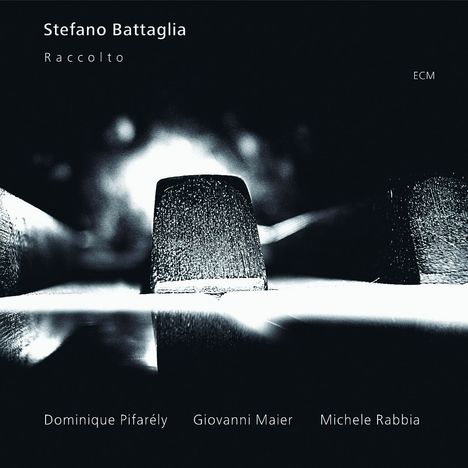Stefano Battaglia: Raccolto auf 2 CDs
Raccolto
Herkömmliche CD, die mit allen CD-Playern und Computerlaufwerken, aber auch mit den meisten SACD- oder Multiplayern abspielbar ist.
(soweit verfügbar beim Lieferanten)
- Label:
- ECM
- Aufnahmejahr ca.:
- 2003
- Artikelnummer:
- 7853678
- UPC/EAN:
- 0602498706701
- Erscheinungstermin:
- 28.10.2005
In this beautiful duo album by two of Italy’s most creative musicians, roles are frequently overturned, as lyrical percussion shades into electronics and texture turns to melody. Stefano Battaglia reminds us that the piano is also a percussion instrument and Michele Rabbia is sensitive to all the tonal implications of drums and cymbals. The musicians play with and without scores in material that is variously open-form, tightly-controlled, inspired by folk idioms, by liturgical music and by art installations. Battaglia allows beautiful themes to ripple through the work, and sounds are given room to blossom. Duets for piano and percussion have long represented an important zone in the work of Stefano Battaglia (in the early 1990s, he collaborated with both Tony Oxley and Pierre Favre). Since 2000, Michele Rabbia has been Battaglia’s principal percussionist, appearing on both of his previous ECM releases – “Raccolto” and “Re: Pasolini” – as an ensemble member and fellow improviser. On “Pastorale” the musicians shape the music together.
Rezensionen
allmusic. com: Milanese pianist and composer Stefano Battaglia has walked on both sides of the classical and jazz street with ease and comfort. Whether performing Bill Evans or Pierre Boulez, he plays with integrity and authority. The double-disc Raccolto is his ECM debut, and he performs in two different settings to illustrate his tremendous gifts as both an improviser and a composer. His romantic leanings and sometimes pointillistic playing reveal his influences, from Evans to Paul Bley to Keith Jarrett. He carries his mentors with ease inside his gig bag. Disc one showcases Battaglia in a jazz trio setting with bassist Giovanni Maier and percussionist Michele Rabbia (who plays on both discs). Here, lush lyricism folds into free improvisation as the dreamy movement between the opening title cut gives way to the long, abstract "Triangolazioni." And though the latter track is completely outside, it has no edges, no burrs, no dissonances that are not enveloped inside the whole. Likewise, the skeletal space of "Triosonic" provides breathing room in contrast to the dense, more fluid post-bop improvisation in "All Is Language," where Battaglia dazzles with his multivalent ostinati. The second disc in this collection features Rabbia and Battaglia with violinist Dominique Pifarély, a member of Louis Sclavis' group. These 12 tunes are full of bracing improvisations and textural tension. The edgy "Porquoi?" and the hissing string introduction to "Il Circo Ungherese" are enough to send most jazz fans screaming for the hills. Those new music fans who haven't heard Pifarély or Battaglia before will be delighted at their structured approach to the outside. There is no self-indulgence here, only disciplined listening and authoritative execution. These 12 pieces are without reservation explorations into unknown sounds and combinations of sounds. The two discs together are all but irresistible to fans of the new European music.
Disk 1 von 2 (CD)
-
1 Raccolto
-
2 Triangolationi
-
3 Triosonic I
-
4 All Is Language
-
5 Our circular song
-
6 Coro
-
7 Triosonic II
-
8 In front of the fourth door
-
9 L'osservanza
Disk 2 von 2 (CD)
-
1 Lys
-
2 Canto I (Dell'agonia Della Terra)
-
3 Riconoscenza
-
4 Reminiscence Pour Violin Et Piano
-
5 Pourquoi?
-
6 Il Circo Ungherese
-
7 Veritas
-
8 Velario de marzo
-
9 Recitativo In Memoria Di Luciano Berio
-
10 Canto II (Dell'agonia Dei Cieli)
-
11 Trois brouillons
-
12 Dulci Declinant Lumina Somno...
Mehr von Stefano Battaglia




